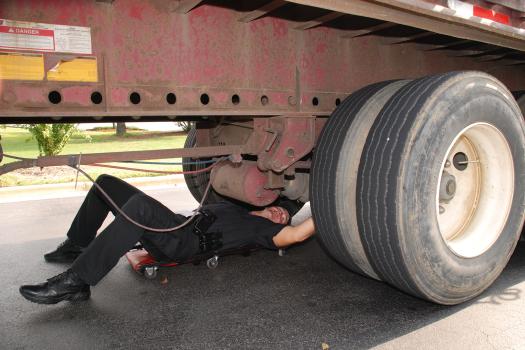Commercial Motor Vehicle Enforcement
The primary purpose of the State Highway Patrol Motor Carrier Enforcement Administration Section is to promote highway safety, enforce all state and federal laws regulating highway and commercial vehicle operations resulting in reduction in crashes, injuries, and fatalities involving large trucks and buses.

To pay a civil, commercial motor vehicle, size/weight or out-of-service citation with a credit/debit card, please visit myNCDPS at payments.ncdps.gov.
Troopers who perform Motor Carrier Enforcement duties ensure that all modes of travel, including commercial motor vehicles, are consistently monitored in order to improve highway safety.
The Motor Carrier Enforcement section is committed to reducing the rate of commercial motor vehicle-involved fatal collisions and fatalities. To accomplish this, the Motor Carrier Enforcement Section is committed to:
- Increase commercial motor vehicle enforcement presence statewide.
- Perform commercial vehicle enforcement activities to reduce commercial vehicle collisions of all types.
- Conduct special enforcement projects to implement the "Motor Carrier New Entrant" program.
- Conduct motor carrier audits.
- Increase the frequency of driver and vehicle inspections.
- Enforce serious commercial driver's license (CDL) violations.
- Patrol the highways of the state to include low tonnage and posted bridge roads to detect overweight vehicle violations.
- Monitor commercial motor vehicle traffic to ensure compliance with the federal bridge and axle tolerance laws.
- Operate the state's permanent weigh stations.
- Perform portable weighing activities.
- Monitor commercial motor vehicle traffic to interdict motor fuels tax evasion.
Documents
Federal Motor Carrier Safety Administration
FMCSA:
- Develops and enforces data-driven regulations that balance motor carrier (truck and bus companies) safety with industry efficiency;
- Harnesses safety information systems to focus on higher risk carriers in enforcing the safety regulations; and
- Targets educational messages to carriers, commercial drivers, and the public.
- FMCSA partners with stakeholders including Federal, State, and local enforcement agencies, the motor carrier industry, safety groups, and organized labor on efforts to reduce bus and truck-related crashes.
FMCSA's Motor Carrier's Guide to Improving Highway Safety
